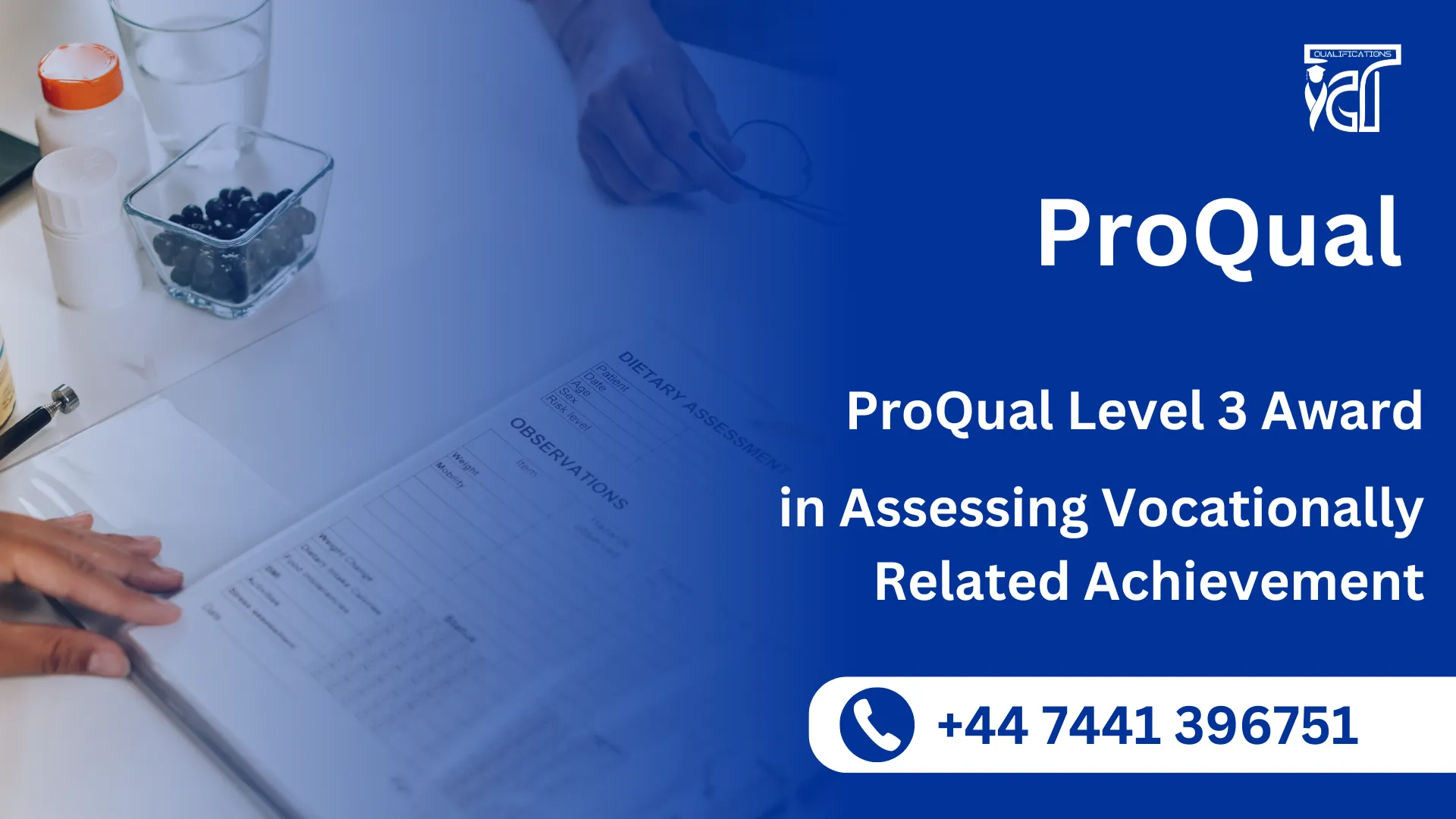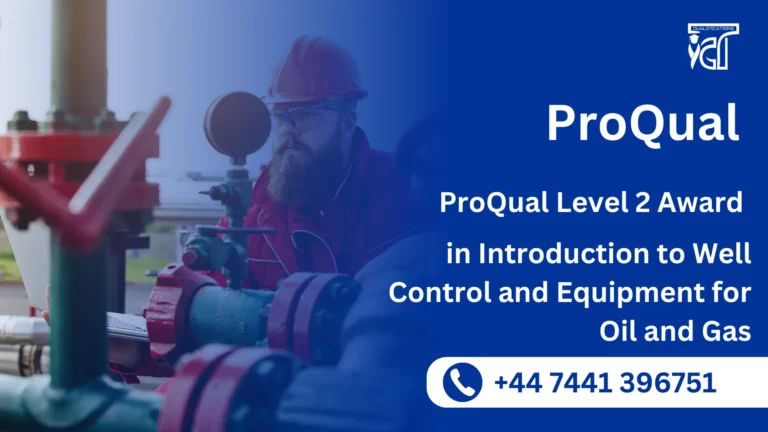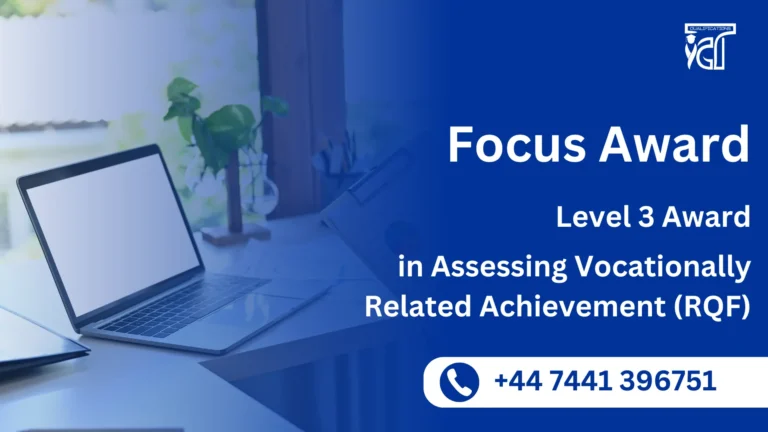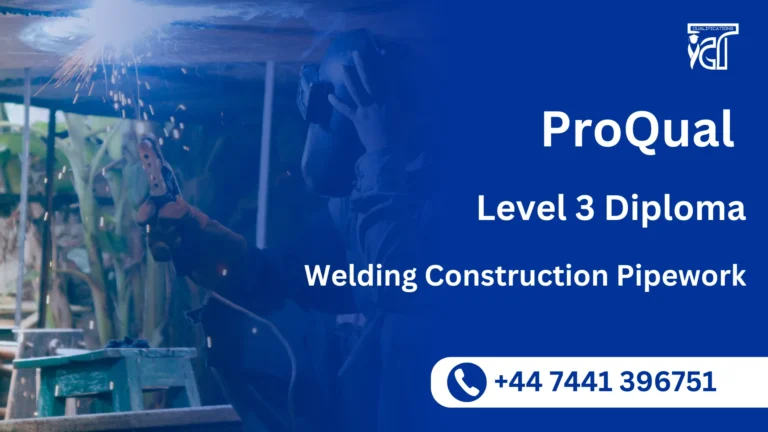In today’s ever-evolving education and training sector, the need for qualified and skilled assessors has never been more significant. One qualification that stands out for those looking to enhance their assessment skills is the ProQual Level 3 Award in Assessing Vocationally Related Achievement. Regulated by Ofqual, this qualification offers a comprehensive and structured pathway for individuals aiming to assess vocationally related achievements in various industries.
The ProQual Level 3 Award in Assessing Vocationally Related Achievement is a qualification designed for individuals who wish to become qualified assessors. This qualification focuses on assessing vocational qualifications and work-based learning in a variety of settings. It is specifically targeted at those who are involved in assessing learners’ skills, knowledge, and competence within vocational training or educational contexts.
This qualification is regulated by Ofqual, ensuring that it meets the highest standards for vocational assessment, and that it provides learners with the skills required to assess vocational qualifications effectively.
As an Ofqual-regulated qualification, the ProQual Level 3 Award adheres to rigorous standards and ensures the credibility of the assessment process. Ofqual regulates qualifications and exams in England, guaranteeing that this qualification meets the needs of both learners and employers.
The ProQual Level 3 Award in Assessing Vocationally Related Achievement offers a flexible and highly regarded qualification for those looking to pursue a career in vocational assessment. With its assignment-based assessment model and Ofqual regulation, it provides learners with the skills necessary to become competent and effective assessors in various vocational contexts.Whether you are an experienced practitioner seeking formal recognition of your assessment skills or a new assessor looking to gain industry-relevant qualifications, this award can help you achieve your career goals.Investing in the ProQual Level 3 Award is a smart decision that can significantly enhance your professional profile, open up new career opportunities, and ensure that you are equipped with the essential skills needed to assess vocationally related achievement effectively and fairly.
ProQual Level 3 Award in Assessing Vocationally Related Achievement
ProQual Level 3 Award in Assessing Vocationally Related Achievement consists of 2 mandatory units having 54 GLH and 90 Hours TQT. Candidates must complete all of the following Mandatory units.
| Sr# | Unit Title | Unit Level | GLH |
|---|---|---|---|
| 1 | Understanding the principles and practices of assessment | 3 | 24 |
| 2 | Assess vocational skills, knowledge and understanding | 3 | 30 |
GLH (Guided Learning Hours) and TQT (Total Qualification Time) are terms commonly used in vocational qualifications to help define the amount of time a learner is expected to spend on their studies.
1. GLH (Guided Learning Hours)
GLH refers to the number of hours a learner spends being directly taught, supervised, or supported during their course. This includes the time spent in activities such as:
- Classroom instruction
- Practical workshops
- One-on-one tutoring or mentoring sessions
- Online learning sessions with tutor support
In other words, GLH represents the time that learners are actively engaged with their instructors or learning activities.
2. TQT (Total Qualification Time)
TQT represents the total amount of time a learner is expected to invest in completing a qualification, including:
- GLH (Guided Learning Hours): Time spent on direct learning, as explained above.
- Self-Directed Learning: This includes time spent on independent study, research, assignment completion, preparation for exams, and any other work the learner does outside of direct teaching hours.
TQT is a broader measure that includes all the time required to achieve the qualification. It helps learners and employers understand the overall commitment required for the qualification.
Key Differences Between GLH and TQT:
- GLH focuses on direct learning with guidance or supervision.
- TQT includes GLH as well as independent study time and other learning-related activities.
Example:
If a qualification has a TQT of 600 hours and a GLH of 250 hours, it means the learner should spend 250 hours in direct learning (classroom, online, or tutor-led sessions) and 350 hours on independent study or research.
ProQual Level 3 Award in Assessing Vocationally Related Achievement
Understanding the principles and practices of assessment
- Understand the principles and requirements of assessment
- Understand different types of assessment method
- Understand how to plan assessment
- Understand how to involve learners and others in assessment
- Understand how to make assessment decisions
- Understand quality assurance of the assessment process
- Understand how to manage information relating to assessment
- Understand the legal and good practice requirements in relation to assessment
Assess vocational skills, knowledge and understanding
- Be able to prepare assessments of vocational skills, knowledge and understanding
- Be able to carry out assessments of vocational skills, knowledge and understanding
- Be able to provide required information following the assessment of vocational skills, knowledge and understanding
- Be able to maintain legal and good practice requirements when assessing vocational skills, knowledge and understanding
Benefits of the ProQual Level 3 Award in Assessing Vocationally Related Achievement
The ProQual Level 3 Award in Assessing Vocationally Related Achievement provides several key benefits for individuals pursuing a career in assessment or education. Some of the main benefits include:
1. Developing Essential Assessment Skills
- The course equips learners with the necessary skills to assess vocational qualifications effectively, ensuring they can competently evaluate learners’ abilities and achievements.
2. Increased Career Opportunities
- This qualification is recognized by employers and professional bodies, enhancing career prospects in various sectors, including education, training, and industry-based assessment roles.
3. Understanding of Vocational Assessment Methods
- Learners gain a deep understanding of different assessment methods, including formative, summative, and holistic approaches, tailored specifically to vocational contexts.
4. Improved Confidence in Delivering Assessments
- The course builds confidence in assessing learners’ achievements, enabling individuals to provide constructive feedback and effectively guide learners through their vocational training.
5. Recognition of Professional Competence
- Upon successful completion, candidates receive a qualification that recognizes their competence in assessing vocationally related achievement, boosting credibility and professional standing.
6. Flexibility in Delivery
- The course can be delivered through various learning methods (including online and in-person), allowing flexibility for learners to complete the qualification at their own pace while balancing work commitments.
7. Understanding of Relevant Standards and Regulations
- Learners will become familiar with key regulations and standards in assessment, ensuring that their practices meet industry expectations and comply with relevant requirements.
8. Foundation for Further Qualifications
- This award serves as a stepping stone for individuals wishing to pursue higher-level qualifications in assessment or education, such as the Level 3 Award in Education and Training (AET) or Level 4 qualifications.
9. Enhanced Credibility in Teaching and Training Roles
- For those involved in teaching or training, this qualification enhances credibility, demonstrating expertise in assessing vocational qualifications and improving the overall quality of teaching and training programs.
10. Professional Development
The course provides an excellent opportunity for continuous professional development, ensuring that assessors stay updated with current practices and trends in vocational training and assessment.
The ProQual Level 3 Award in Assessing Vocationally Related Achievement is best suited for individuals who are involved in or wish to become involved in assessing vocational qualifications. Here are some of the key groups who would benefit most from this course:
1. Vocational Assessors
- This course is ideal for those who already work or plan to work as assessors in vocational settings, such as those assessing apprenticeships or other vocationally related qualifications.
2. Teachers and Trainers in Vocational Education
- Teachers or trainers delivering vocational qualifications can enhance their assessment skills, ensuring that their students are assessed effectively and fairly in line with industry standards.
3. Training Providers
- Individuals working in training organizations or with training providers who need to assess learners’ achievements in vocational programs will find this qualification beneficial for developing their assessment skills and improving their delivery.
4. Workplace Mentors and Coaches
- Professionals working in industry who mentor or coach apprentices or new employees can benefit from this course by gaining formal assessment qualifications to support their role in evaluating learners’ vocational development.
5. Those Looking to Transition into Assessment Roles
- Individuals with experience in a specific vocational field who want to transition into assessment or training roles can use this course as a foundation to gain the necessary qualifications and skills.
6. HR Professionals
- HR personnel who are involved in the recruitment, training, and development of staff, and who may be required to assess competency levels or progress in vocational roles, will benefit from the knowledge gained in this course.
7. Quality Assurance Professionals
- Individuals involved in quality assurance in training organizations or businesses that offer vocational qualifications can benefit from the skills learned to ensure their assessment practices are rigorous, fair, and meet required standards.
8. Employers in Apprenticeship Programs
- Employers who run apprenticeship schemes or internal training programs, and who need to assess employees’ vocational achievements, would gain value from this qualification to enhance their assessment practices.
9. Those Interested in Career Progression in Education
- If you’re looking to further your career in the educational sector or specialize in vocational education, this qualification provides a clear path to gaining the required skills for assessing vocationally-related achievements.
Entry Requirements
Register Now
Qualification Process
Qualification Process for the ProQual Level 3 Award in Assessing Vocationally Related Achievement
- Self-Assessment:
Begin by evaluating your eligibility to ensure you meet the qualification requirements, including work experience, knowledge, and language proficiency. - Registration:
Complete your registration by submitting the required documents, including a scanned copy of a valid ID, and paying the registration fee. - Induction:
An assessor will conduct an induction to confirm your eligibility for the course and explain the evidence requirements. If you do not meet the criteria, your registration will be canceled, and the fee will be refunded. - Assignmnets & Evidence Submission:
Provide all assignmnets and the necessary evidence based on the assessment criteria outlined in the course. If you are unsure of the required evidence, consult with the assessor for guidance on the type and nature of evidence needed. - Feedback and Revision:
The assessor will review your submitted evidence and provide feedback. Evidence that meets the criteria will be marked as “Criteria Met,” while any gaps will be identified. You will be asked to revise and resubmit if needed. - Competence Evidence:
Submit final evidence demonstrating that all learning outcomes have been met. This evidence will be marked as “Criteria Met” by the assessor once it is satisfactory. - Internal Quality Assurance (IQA):
The Internal Quality Assurance Verifier (IQA) will review your evidence to ensure consistency, quality, and compliance with standards. - External Verification:
The IQA will submit your portfolio to ProQual’s External Quality Assurance Verifiers (EQA) for final confirmation. The EQA may contact you directly to verify the authenticity of your evidence. - Certification:
Upon successful completion of all checks, ProQual will issue your official certificate, confirming that you have attained the ProQual Level 3 Award in Assessing Vocationally Related Achievement.







